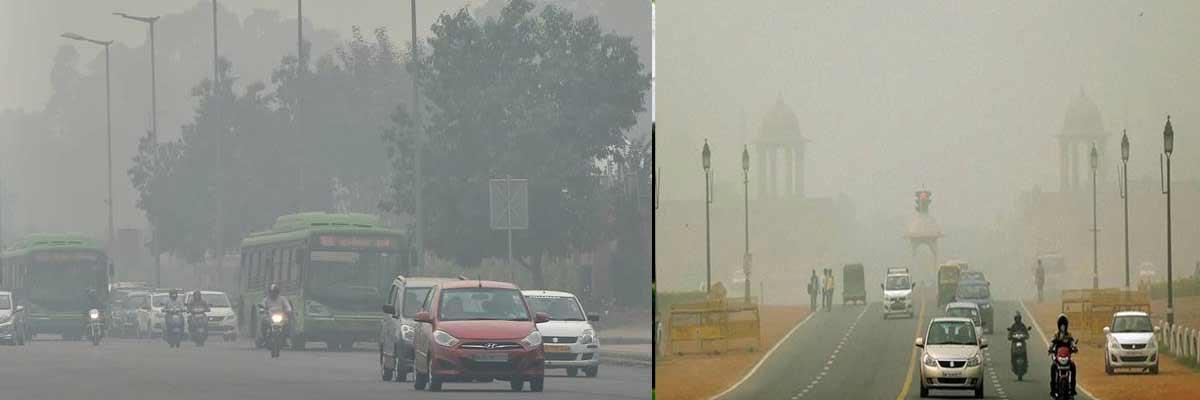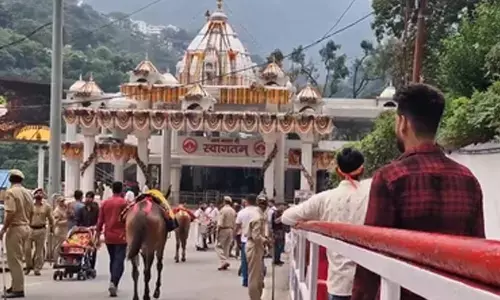Delhi's air quality remains severe for second day: Authorities

Delhis air quality remained in the severe category for the second consecutive day on Tuesday as low wind speed prevented dispersion of pollutants even as authorities predicted further deterioration
New Delhi: Delhi's air quality remained in the "severe" category for the second consecutive day on Tuesday as low wind speed prevented dispersion of pollutants even as authorities predicted further deterioration.
Supreme Court-appointed Environment Pollution Control Authority (EPCA) Chairperson Bhure Lal said they were monitoring the situation and if severe conditions persisted for 48 hours, stringent action, as prescribed under the Graded Response Action Plan, would be implemented. The Central Pollution Control Board (CPCB) recorded an overall air quality index (AQI) of 411 which falls in the "severe" category. The AQI on Monday was recorded at 412. On Tuesday, neighbouring Ghaziabad, Noida and Faridabad also recorded "severe" air quality.
Ghaziabad's air quality was the worst at an AQI of 429, the CPCB data showed. Gurgaon recorded "very poor" air quality, the CPCB data said. An AQI between 201 and 300 is considered "poor", 301 and 400 "very poor" and 401 and 500 "severe". Twenty-one areas in Delhi recorded "severe" air quality and nine areas recorded "very poor" air quality, according to the CPCB. Rohini and Wazirpur edged towards "severe plus emergency" category with an AQI of 471 and 472 respectively, the CPCB data showed. Stringent actions include emergency measures like odd-even car rationing scheme.
A ban on construction activities would be enforced in the city if "severe" pollution level persists for 48 hours. Under the "severe" category, even healthy people find it hard to breathe and doctors advise physical activity to be kept at a minimum. Authorities said they are closely monitoring the situation. The overall PM2.5 level -- fine particulate matter in the air with a diameter of less than 2.5 micrometre -- was recorded at 261 and the PM10 level at 450, it said. The Centre-run System of Air Quality and Weather Forecasting (SAFAR) said the overall air quality of Delhi will further deteriorate over the next two days. "Values are likely to remain in the same range on Tuesday and likely to decline by Wednesday. Calm surface winds are not allowing pollutants to disperse," it said. "Winds are calm and dispersion is low.
Western disturbances influence may impact Delhi's air quality by introducing moisture and making the air heavy. The expected fall in temperature and moderate fog is likely to increase pollution over the coming two days and will keep the air quality in the upper level of 'very poor'," the SAFAR said. It said the air quality might improve on Wednesday if sufficient amount of rainfall occurs, which is expected. "However, marginal shower often deteriorates air quality because high moisture content overshadows the wash-out effect. In all probability, the AQI will remain within the limit of 'very poor' and will not touch 'severe'," the SAFAR said. "Levels of gaseous pollutants, NOx and CO are forecast to be enhanced, up to moderate range, after a long time due to a fall in boundary layer height and reduced vertical mixing," it said.
The EPCA chairperson said that if winds blew, air quality might improve, and hoped that the predicted rainfall pulled the air quality down from the "severe" category. According to the Indian Institute of Tropical Meteorology, the maximum ventilation index is likely to be 2500 sqm/second from December 10-12. The ventilation index lower than 6000 sqm/second with average wind speed less than 10 kmph is unfavourable for dispersion of pollutants. Air quality is likely to deteriorate marginally on Tuesday under the low wind and lower ventilation index but will remain in the "very poor" category, the IITM said. The wind speed, ventilation index and higher moisture are highly unfavourable for dispersion of pollutants, it added.









